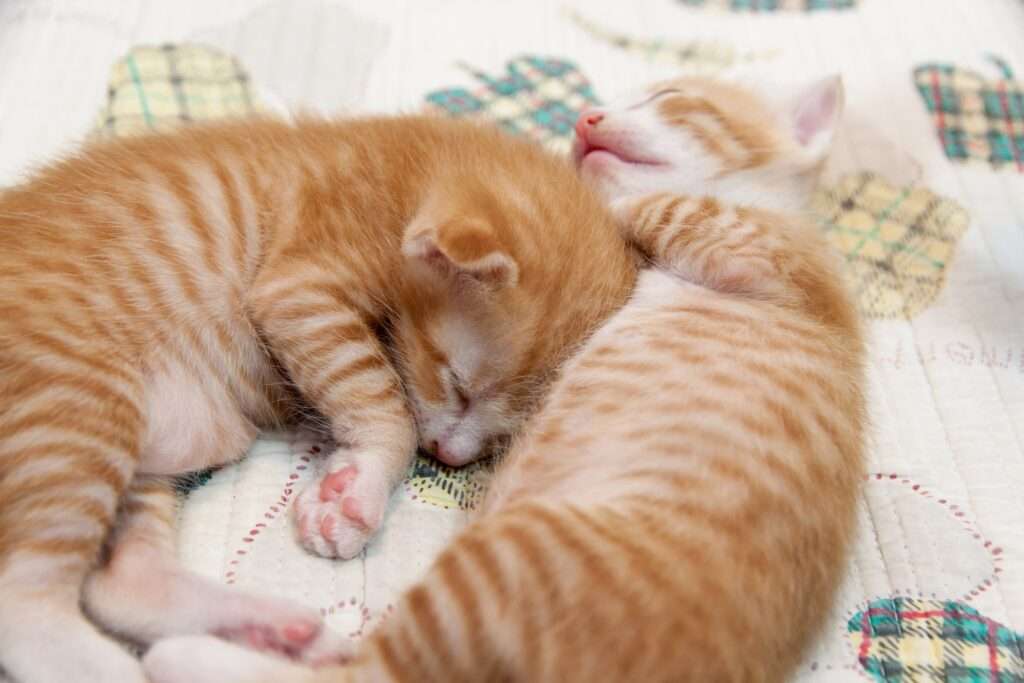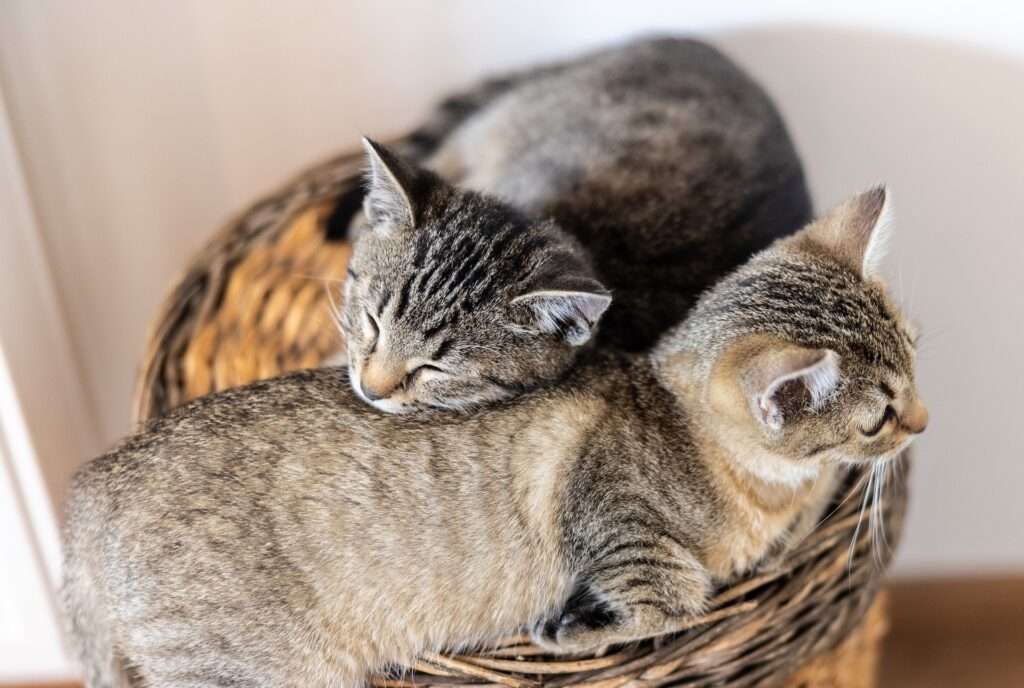How Much Do Kittens Sleep? Deciphering Your Kitten’s Sleep Patterns
As a new kitten owner, it’s important to understand your furry friend’s sleeping habits. Kittens are known for their love of naps and can often sleep up to 16 hours a day! But why do kittens sleep so much? And how can you ensure that your kitten is getting the right amount of rest?
In this comprehensive guide, we’ll explore everything you need to know about how much kittens sleep and provide you with tips for creating a sleep-friendly environment for your feline friend.
Understanding a Kitten’s Sleep Needs

Kittens have a lot of growing to do in their first year of life, and sleep plays a crucial role in their development. On average, a kitten will sleep between 12 and 16 hours a day, which is significantly more than adult cats. However, this sleep isn’t continuous; kittens go through different stages of sleep, including light sleep, deep sleep, and REM sleep.
During these stages, their bodies and brains are hard at work, allowing them to grow and develop at a healthy pace. As kittens grow and develop, their sleep needs will change. Younger kittens may sleep more than older kittens, while kittens who are more active during the day may sleep less.
It’s important to pay attention to your kitten’s individual sleep needs and adjust their sleeping arrangements accordingly. In the next section, we’ll discuss some factors that can affect a kitten’s sleep, such as diet and exercise.
Factors that Affect a Kitten’s Sleep
A kitten’s sleep can be affected by a number of different factors, including their diet, exercise, and environment. Kittens who are fed a balanced diet that meets their nutritional needs are more likely to sleep well, while kittens who are underfed or overfed may have trouble sleeping.
Exercise and play also play a role in a kitten’s sleep; kittens who have plenty of playtime during the day are more likely to sleep soundly at night. The environment in which a kitten sleeps can also impact their sleep quality.
Kittens who sleep in a quiet, dark, and comfortable area are more likely to sleep well than those who are exposed to loud noises or bright lights. It’s important to create a safe and comfortable sleeping space for your kitten to ensure they get the rest they need.
The Importance of Sleep for a Kitten’s Health
Sleep is essential for a kitten’s physical and mental health. During sleep, a kitten’s body is hard at work repairing and growing, while their brain is processing and storing information from the day. Without enough sleep, a kitten may experience behavioral problems, such as hyperactivity or aggression.
Lack of sleep can also weaken a kitten’s immune system, making them more susceptible to illness. As a kitten owner, it’s important to ensure that your furry friend is getting enough sleep to stay healthy and happy.
Providing a safe and comfortable sleeping area, feeding a balanced diet, and allowing plenty of play and exercise time during the day are all important steps in ensuring your kitten gets the rest they need. In the next section, we’ll provide tips for creating a sleep-friendly environment for your kitten.
Creating a Sleep-Friendly Environment for Your Kitten

Creating a safe and comfortable sleeping environment for your kitten is essential for their overall health and well-being. Here are some tips for making sure your kitten gets a good night’s sleep:
- Provide a cozy bed: Choose a bed that is soft, warm, and comfortable for your kitten to sleep in. You can use a pet bed, a blanket, or even a cardboard box lined with blankets.
- Keep the area quiet and dark: Make sure your kitten’s sleeping area is located in a quiet and dark part of your home, away from any sources of noise or bright lights.
- Set up a routine: Establishing a regular bedtime routine can help your kitten feel calm and relaxed before bedtime. Try incorporating a few minutes of playtime followed by a quiet cuddle session before bed.
- Avoid disruptions: Try to minimize disruptions during your kitten’s sleep, such as loud noises or sudden movements. If you have other pets, make sure they don’t disturb your kitten during their nap time.
By following these tips, you can create a sleep-friendly environment for your kitten and ensure they get the rest they need.
Common Sleeping Behaviors in Kittens
Kittens have some unique sleeping behaviors that can be both cute and interesting to observe. Here are a few common sleeping behaviors you might notice in your furry friend:
- Curling up in a ball: Many kittens like to curl up in a ball while they sleep. This position allows them to conserve body heat and feel safe and secure.
- Kneading: Kittens often knead with their paws while they sleep, a behavior that is thought to stem from their nursing days. Kneading can be a sign that your kitten is feeling content and relaxed.
- Purring: Like kneading, purring is a sign that your kitten is feeling content and relaxed. Kittens often purr while they sleep, which can be a soothing sound to listen to.
- Twitching: During REM sleep, kittens may experience muscle twitches and eye movements. This is a normal part of the sleep cycle and is nothing to be concerned about.
By understanding these common sleeping behaviors, you can better understand your kitten’s sleep patterns and behaviors. If you have any concerns about your kitten’s sleep, talk to your veterinarian for guidance.
When Does a Kitten Become a Cat?
As your kitten grows and develops, you may be wondering when they officially become a cat. While there’s no set age at which a kitten becomes a cat, there are a few milestones to look for.
Physically, a kitten is considered to be fully grown by the time they reach 1 year of age. However, some breeds of cats, such as Maine Coons and Persians, may not reach their full size until they are 2-3 years old.
Behaviorally, a kitten may start to exhibit more “cat-like” behavior around 6 months of age. This can include increased independence, decreased playfulness, and a more relaxed demeanor.
Socially, a kitten may start to interact more with other cats and animals around 4-6 months of age. They may also become more territorial and start to mark their territory.
Overall, it’s important to remember that every kitten develops at their own pace, and there’s no set timeline for when a kitten becomes a cat. However, by observing your kitten’s physical, behavioral, and social development, you can start to get a sense of when they are transitioning into adulthood.
Sleeping Issues in Kittens

While kittens generally sleep a lot, there are some sleeping issues that may arise. Here are a few potential problems to watch out for:
- Insomnia: If your kitten is having trouble falling asleep or staying asleep, they may be experiencing insomnia. This can be caused by a variety of factors, including stress or an uncomfortable sleeping environment.
- Sleep apnea: Sleep apnea is a condition in which a kitten’s breathing is interrupted during sleep. Symptoms include loud snoring or snorting sounds while sleeping, as well as restless sleep and fatigue during the day.
- Restlessness: Some kittens may be restless during sleep, tossing and turning or waking up frequently. This could be a sign of an underlying health condition or simply an uncomfortable sleeping environment.
If you notice any of these sleep issues in your kitten, it’s important to talk to your veterinarian. They can help diagnose any underlying conditions and provide guidance on how to improve your kitten’s sleeping habits.
Conclusion
In conclusion, kittens sleep a lot, with most kittens sleeping for up to 16 hours per day. Sleep is essential for a kitten’s physical and mental health, and providing a safe and comfortable sleeping environment is key to ensuring your furry friend gets the rest they need.
By understanding your kitten’s sleep patterns and behaviors, you can better care for their needs and provide them with a happy and healthy life. If you have any concerns about your kitten’s sleeping habits, talk to your veterinarian for guidance and support. With proper care and attention, you can help your kitten get the rest they need to grow and thrive.
Frequently Asked Questions
How much do kittens sleep per day?
On average, a kitten will sleep between 12 and 16 hours a day, which is significantly more than adult cats. However, this sleep isn’t continuous; kittens go through different stages of sleep, including light sleep, deep sleep, and REM sleep.
Do kittens sleep more than adult cats?
Yes, kittens sleep more than adult cats. On average, adult cats sleep between 12 and 14 hours a day, while kittens can sleep up to 16 hours a day.
Why do kittens sleep so much?
Kittens have a lot of growing to do in their first year of life, and sleep plays a crucial role in their development. During sleep, kittens release growth hormones that help them develop strong bones and muscles. Additionally, sleep helps kittens process and retain the information they learn during their waking hours.
What are the different stages of sleep that kittens go through?
Kittens go through three different stages of sleep: light sleep, deep sleep, and REM sleep. During light sleep, kittens may twitch or move around, and they can easily be woken up. During deep sleep, kittens are completely still and difficult to wake up. REM sleep is when kittens dream, and their eyes may move rapidly under their eyelids.
How can I tell if my kitten is sleeping too much?
While kittens do sleep a lot, excessive sleeping can be a sign of illness or other health problems. If you notice that your kitten is sleeping more than usual or seems lethargic during their waking hours, it’s a good idea to take them to the vet for a checkup.
Should I wake my kitten up if they’re sleeping too much?
No, it’s generally not a good idea to wake your kitten up if they’re sleeping. Kittens need a lot of sleep to grow and develop properly, and interrupting their sleep can be disruptive to their health and well-being.
Do kittens sleep through the night?
Yes, most kittens will sleep through the night once they’re a few months old. However, it’s important to note that kittens may still wake up occasionally to play or use the litter box.
Should I let my kitten sleep in my bed?
This is a personal preference, but it’s generally not recommended to let your kitten sleep in your bed. Kittens can be disruptive to your sleep, and there’s also a risk of accidentally rolling over on them during the night.
How can I help my kitten sleep better?
Creating a comfortable and quiet sleeping environment for your kitten can help them sleep better. This can include providing a cozy bed, using a white noise machine to block out noise, and keeping the room at a comfortable temperature.
When do kittens start sleeping through the night?
Kittens typically start sleeping through the night once they’re a few months old, usually around 4-6 months of age. However, every kitten is different, so it’s important to pay attention to your kitten’s individual sleeping habits and needs.





